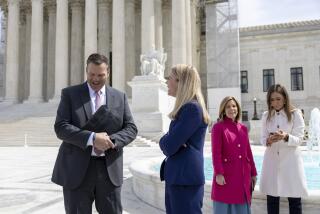Two Rulings on Clinic Blockades at Odds
- Share via
A federal appeals court in New York on Wednesday ruled unanimously that a 19th-Century law that entitled blacks to protection from the Ku Klux Klan can be used by women who claim that their civil rights were violated by groups that blockade abortion clinics.
The decision by the U.S. 2nd Circuit Court of Appeals flies squarely in the face of a ruling issued on Monday by a federal judge in Los Angeles.
In that ruling, U.S. District Judge A. Wallace Tashima stated that “abortion seekers” do not qualify as a special class of people entitled to protection under the “Ku Klux Klan Act.” The law was enacted more than 100 years ago to protect blacks after the Civil War.
Tashima’s ruling shook the legal foundation of a lawsuit that attacked anti-abortion blockades as a civil rights violation.
The lawsuit was filed last March by the American Civil Liberties Union on behalf of several organizations in anticipation of blockades by the anti-abortion group Operation Rescue in seven California cities.
Tashima issued an injunction barring the blockades and, in late August, ruled that several Operation Rescue leaders had violated the injunction. He ordered them to pay $110,000 in attorney fees to the ACLU and other lawyers to cover costs incurred in bringing a contempt action on behalf of pro-choice groups.
In late August, Operation Rescue moved to have the entire suit dismissed on the grounds that the plaintiffs lacked standing to sue.
On Monday, Tashima gave the plaintiffs 30 days to amend their complaint, but expressed “grave doubt” that they could succeed.
The New York case arose in a similar fashion to the California case, with pro-choice groups seeking injunctions to prohibit Operation Rescue from blockading clinics there.
Carol Sobel, a lawyer for the American Civil Liberties Union in Los Angeles, said she was delighted by the New York decision, which is the first ruling by a federal appeals court on the issue of whether the Ku Klux Klan Act can be used by women in abortion protest cases.
The decision is not binding on courts in other circuits--including California--but Sobel said it increased the possibility that the Los Angeles ACLU suit can still succeed.
“I think we can do it,” she said. “All we have to do (to survive a dismissal motion) is show that this isn’t a frivolous claim. The 2nd Circuit’s reasoning makes it clear that this is not a frivolous claim.
“The 2nd Circuit Court of Appeals has said that any woman could be subject to Operation Rescue’s conduct, not just women seeking abortions,” she explained. “Operation Rescue really doesn’t distinguish between whether a woman is pregnant or not or wants an abortion or not. They try to stop everyone from coming into those clinics when they’re having a blockade.”
The judges said the key issue in the case is whether the Ku Klux Klan Act “encompasses conspiracies motivated by and against a class of women seeking medical and abortion-related services.”
They held that there was precedent for extending the protections of the law to persons other than blacks, particularly women who were not given the right to vote until 55 years after the Civil War.
And the appellate court noted that the U.S. Supreme Court had not specifically ruled on the question but had acknowledged that legislative history supported the view that the aim of the Ku Klux Klan Act “went beyond racially motivated conspiracies.”
The appellate decision came to diametrically different conclusions from Tashima’s decision on several key points. Tashima said that Operation Rescue’s activities were not directed against women as a class, but against the “sub-group” of women seeking abortions.
In sharp contrast, the New York judges said “it is sophistry” for Operation Rescue to assert that it was not acting with hostility toward women in general simply because its actions are directed only against women seeking to use the clinics.
Not Concerned
Samuel B. Casey, a lawyer for the Rutherford Institute of California, an anti-abortion organization based in Sacramento, said he was not particularly concerned about the New York decision.
Casey said that the U.S. 9th Circuit Court of Appeals, which covers nine states, including California, tends to take a “less expansive” view of the Ku Klux Klan Act than the New York circuit.
More to Read
Sign up for Essential California
The most important California stories and recommendations in your inbox every morning.
You may occasionally receive promotional content from the Los Angeles Times.













